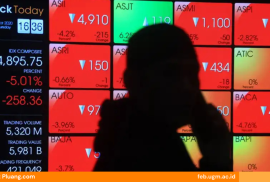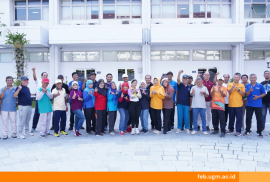The 4th Management’s Forum: Sharing webinar series entitled “Adapting ZMET to online context: Exploring the mental map of marginalized society during the pandemic” presented by the Management Laboratory of the Faculty of Economics and Business UGM was held on Friday (11/06). In this 4th series, two special speakers were present, namely B.M Purwanto, Ph.D. and also Rokhima Rostiani, M.Mgmt. who will share about using the ZMET method in an online context. ZMET itself is an acronym for the Zaltman Metaphor Elicitation Technique, which is a method for searching for truth in the subconscious by exploring the thought processes and behavior of participants.
The event was opened and guided by Bayu Sutikno, Ph.D. as moderator in this series and continued with the presentation of material about research using ZMET conducted by B.M Purwanto and Rokhima. At the beginning of the session, B.M Purwanto told a little about the background of the research implementation. He told me that during the Covid-19 pandemic, which has lasted for more than a year, many people have been affected both in terms of health and financially. From all people, those most affected by the bad impact of the pandemic are those who are marginalized. It is on the basis of anxiety about marginalized communities that there is an urgency to conduct research whose results will be able to help the government design policies that are beneficial to them.
The research was conducted in collaboration with the Johns Hopkins Center for Communication Programs (CCP) based in the United States and the Indonesian government through the Covid-19 Task Force. The ZMET method was adopted as a modified data collection technique by interviewing the metaphor technique. The participants were 15 people with an average education level of elementary-junior high school and various livelihoods through a series of interviews that focused on the future projections of participants. This ZMET interview is highly structured and actually consists of many steps. However, due to online implementation constraints and so on, several steps had to be reduced.
Furthermore, Rokhima explained the steps for conducting the research interview in more detail. The first step, participants were given 2 days to choose 6-10 pictures using their feelings. The second step, participants were asked to describe and tell the meaning of the pictures they chose. From the participants’ stories, the researcher tried to delve deeply into hidden thoughts and feelings to obtain an interpretation. The next step, participants are involved in a highly structured interview process. This time, the researcher carried out a laddering process to get an in-depth understanding of the abstraction of the constructs presented by the participants. Finally, participants were asked to represent the topic under study with the functions of the five senses to clarify the construct and enrich the data in the analysis process.
The series of ZMET interview steps then produced a mental map of each participant. The mental map describes several aspects that are interpreted by participants such as values held, problems experienced, and beliefs that are believed that have an influence on participant’s feelings and behavior. Through these feelings and behaviors, participants can describe beliefs and hopes for the future they desire. Some of the things that have been highlighted from the participants’ mental maps by researchers are the participant’s character and attitudes towards the Covid-19 pandemic and government policies related to its handling.
The results of these studies, among others, suggest that there is an awareness of an unfair social structure. Several participants expressed their belief that society consists of groups that benefit and face different risks. In addition, some participants felt that they were discriminated against in the provision of assistance during the PSBB and from development policies. But apart from that, there were also some participants who during the pandemic were actively involved in donating and suggested complying with the health protocols on the advice of the government that reflected social care and advocacy from the community.
Reportage: Kirana Lalita Pristy/Sony Budiarso.



